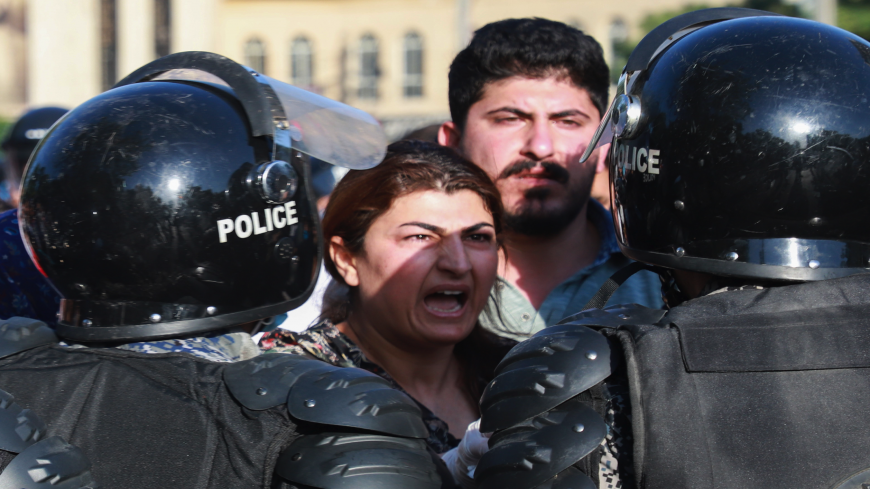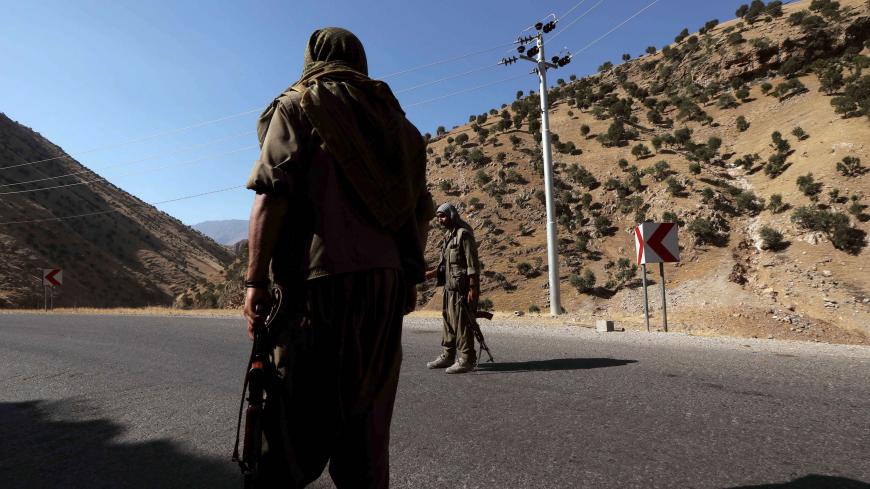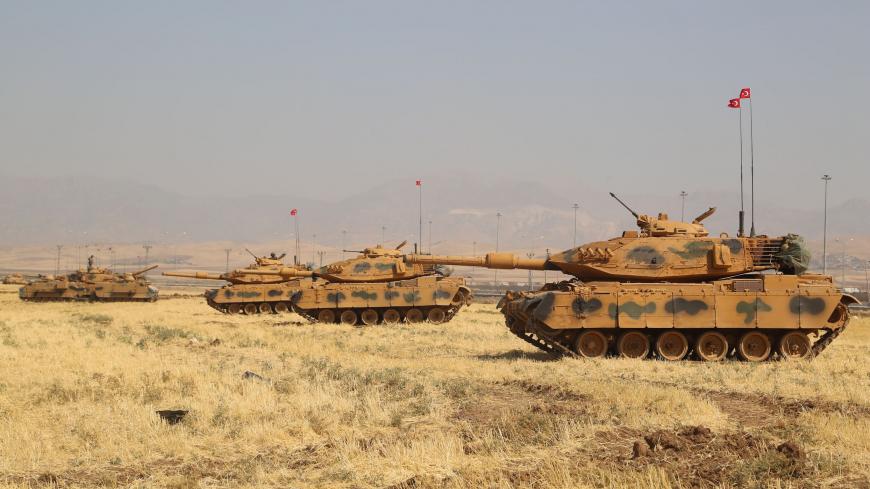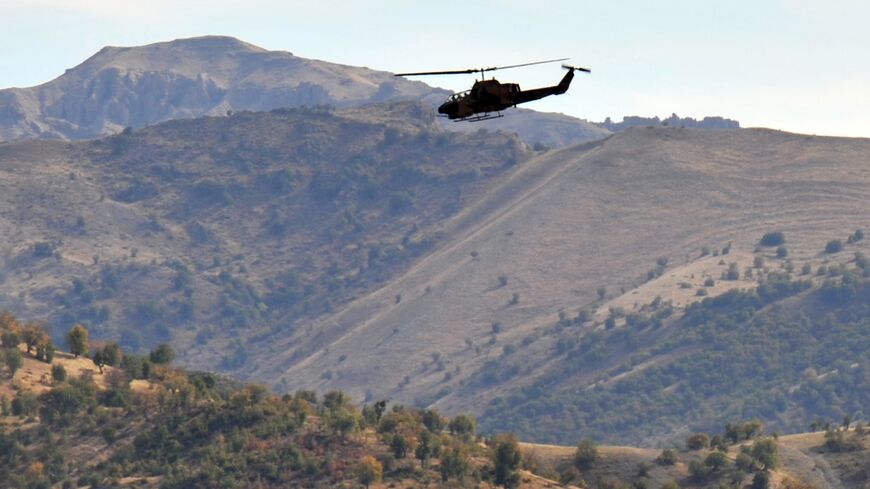Baghdad silent as Turkey moves deeper against PKK militants in northern Iraq
A drone attack on Monday comes amid widening Turkish operations against PKK targets inside Iraqi Kurdistan.
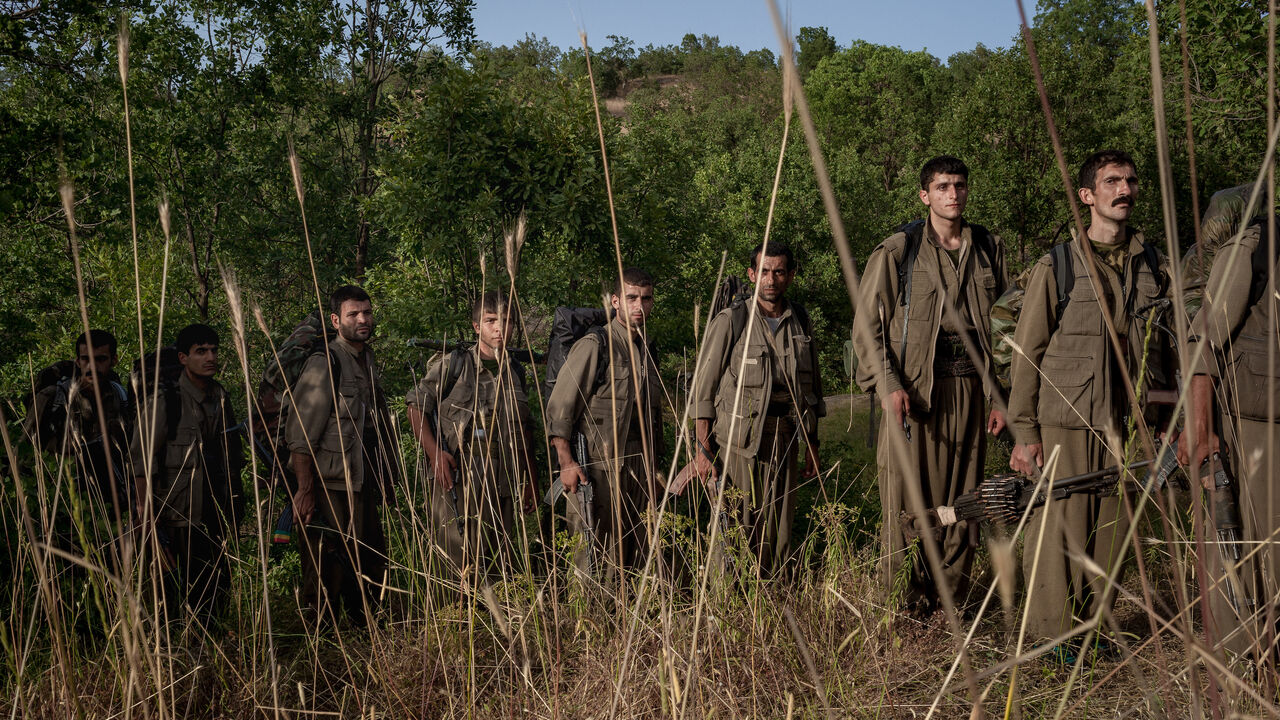
A Turkish drone on Monday struck a vehicle that allegedly belonged to the outlawed Kurdistan Workers Party (PKK) in the village of Tel Qasab in Iraq’s Sinjar district, resulting in multiple casualties, according to a federal police source cited by Iraqi media. PKK-linked media reported that two journalists and their driver, along with a bystander, were wounded in the attack.
Turkey has repeatedly targeted alleged PKK operatives in Sinjar in recent years in a bid to eliminate the group’s hold over the area, which is home to Iraq’s ethnic Yazidis and forms a strategic land bridge for PKK militants moving between Iraq and Kurdish-controlled northeast Syria. The PKK established a foothold in Sinjar in 2014 — when the Islamic State unleashed its genocidal campaign against the Yazidis — shepherding thousands to safety through a corridor running to Syria then back to Mount Sinjar.
The region is currently dominated by a patchwork of forces, including Iran-backed Shiite militias and Yazidi armed groups that are loyal to the PKK and that cooperate with one another tactically; others are more independent. In April, Turkey’s Foreign Minister Hakan Fidan said Sinjar needed to be cleared of the PKK. “Sinjar is right next to the Syrian border, and as long as the PKK prevails in Sinjar, its interaction with [PKK-linked groups] on the other side of the border will continue. This must be put to an end,” Fidan said in a television interview.
Monday's attack comes amid widening Turkish operations against PKK targets inside Iraqi Kurdistan, with ground troops being moved from Cukurca in Turkey’s Hakkari province to reinforce and expand Turkish bases and outposts in the vicinity of Zap, Metina and Gare, a string of mountains lying immediately south of the Turkish border in Dahuk province, a local PKK commander told Al-Monitor.
“Turkey has been seeking to drive us out of this territory for the past three years, but since April, the Turkish army has been using paved roads to move their troops in, starting a fresh offensive on July 3 to cut off Gare Mountain from our other forces,” the commander said. “They are using warplanes, drones and helicopters; they are using every weapon in their arsenal.” Two brigades are carrying out the ground operations, the PKK commander said.
Murat Karayilan, the veteran PKK commander in charge of the group’s armed wing, the People’s Defense Forces (HPG), is known to be headquartered in the depths of Gare.
The local commander said that Turkey had made headway, capturing several strategic hilltops, but that “our forces are fighting back valiantly from our resistance tunnels and inflicting heavy casualties on the enemy.” The commander was referring to the network of tunnels the PKK has built since Turkey started deploying its globally renowned killer drones against them, making it harder for the group to maintain a presence above the ground as it has done for decades. The PKK claims to have developed its own drones and routinely posts footage which it says shows them successfully striking Turkish positions.
Last Thursday, a high-level Turkish Defense Ministry official told reporters at a briefing in Ankara that Turkey “neutralized 57 terrorists” in northern Iraq and Syria, without specifying how many of them were killed in northern Iraq.
The Community Peacemaker Teams (CPT), a US-based war monitor, said that the Turkish operation had prompted an exodus from 602 villages throughout Dahuk, and that 20,000 dunams of agricultural land had been burned in some 238 Turkish bombardments, primarily in the same province.
Turkish President Recep Tayyip Erdogan has in recent months threatened a major offensive that would clear Iraqi Kurdistan of the rebels once and for all, raising the specter of thousands of Turkish forces pouring across the border. But that hasn’t happened. “The Turkish military knows that it cannot eliminate the PKK entirely, something it has tried repeatedly in the past and repeatedly failed,” a senior Iraqi official who sought anonymity in order to speak freely told Al-Monitor. Rather, the official continued, Turkey was seeking to isolate and squeeze the militants in their strategic strongholds in Sinjar and Gare and further east in Kirkuk and Qandil on the Iranian border, ahead of what the official termed “surgical operations.” The official did not elaborate.
Contain, not collapse
Ultimately, Turkey wants to establish full control over its border with Iraq as much as it does with Syria, where it is conducting parallel operations but largely from the air and on a more limited scale.
The official brushed off speculation that Turkey was seeking to take out Karayilan, noting that even if it did, he is so deeply burrowed he would be extremely difficult to track down.
The official also dismissed reports that Turkey’s offensive is aimed at instilling the sort of public confidence that would allow the government to resume peace talks with the PKK that were shelved in 2015 amid mutual recriminations.
The speculation arises from Erdogan’s plans to revise the constitution so that he can skirt rules that prevent him from running for a third term when the current one expires in 2028. He may resort to support from the pro-Kurdish Peoples’ Equality and Democracy Party (DEM), which, by the government’s reckoning, takes its cues from the PKK, a claim that has been used to jail thousands of its members, including elected officials. DEM supporters have been swaying elections since 2015 in the opposition’s favor.
However, “Turkey does not feel it needs to talk to the PKK and that it’s more the other way around,” the official maintained.
Turkey’s recent spurt of hawkishness coincides with Erdogan’s visit to Iraq in April, his first since 2011, for official talks with Prime Minister Mohammed Shia al-Sudani. The trip yielded numerous dividends, including pledges to cooperate against the PKK. This followed Baghdad’s decision during Fidan’s official visit there in March to “ban” the militants, though it stopped short of labeling them “terrorists” in line with Turkey’s demands.
Risky road
The visit also saw the inking of a four-way memorandum of understanding between Turkey, Iraq, Qatar and the United Arab Emirates for joint cooperation on Iraq’s $17 billion Development Road Project. Launched last year, the 1,200-kilometer (745-mile) road and rail scheme is set to make Iraq a key transit hub, linking Asia and Europe with a link between Turkey and Iraq’s Faw Port in energy-rich Basra.
Sudani, who is intent on being elected for a second term when the current one expires next year, desperately needs a prestige project to boost his image. “So far, he’s done remedial stuff, like fixing roads and bridges to boost efficiency. But the signature project he wishes to sell is the Development Road,” said an Iraqi source with close knowledge of Sudani’s thinking.
Hence, Turkey’s cooperation on the Development Road Project is critical, though it will likely be opposed by Iran, which frowns on any scheme that would thin its influence over Iraq.
The Iraqi Kurds worry, for their part, that the road will bypass their region, making the Ibrahim Khalil crossing with Turkey, the sole formal land link between the sides, less consequential.
“Because this road is designed to bypass [the Kurdistan Region of Iraq] and cut off the land connection of PKK-affiliated forces that control the Iraqi-Syrian border, it has a significant security dimension for Turkey in and of itself, as well as potential risks for the [Kurdistan Regional Government],” the Washington Institute for Near East policy observed in a recent brief.
Despite potential wrinkles, not least the question of financing, Ankara is leveraging the project to secure Baghdad’s support for its anti-PKK operations. This may explain Iraq’s official silence in the face of Turkey’s ongoing infringements on its territory.
Turkey’s outreach to Baghdad chimes with its broader strategy of enlisting its neighbors' cooperation against the PKK, in a replay of its “hot pursuit” agreements signed with Iraq in the 1980s and with Syria in 1998. This explains a big part of Erdogan’s dramatic U-turn on his long-time nemesis, Syrian President Bashar al-Assad, whom he now says he wants to host in Turkey together with Russian President Vladimir Putin.
Today, Erdogan rang Iran’s newly elected President Masoud Pezeshkian to congratulate him on his victory in Friday’s run-off in which he defeated his conservative rival, Saeed Jalili, with 54% of the vote. Erdogan said he hoped bilateral relations between the two countries, “based on deep-rooted historical ties, will further develop in the new era,” according to the Turkish Presidency’s readout of the call.
“Masoud Pezeshkian is actually Turkish of Azerbaijani origin; for instance, he speaks Turkish Tabriz. But when he goes to Kurdish areas, he can also speak Kurdish there,” Erdogan told reporters on his way back from Germany, where he attended Turkey’s ill-fated Euro 2024 quarterfinal soccer match against the Netherlands.
Pezeshkian’s father is ethnic Azeri and his mother is a Kurd. It’s highly improbable that his ethnic background will have any bearing on security policy, which most likely will see Tehran continue to collaborate with Turkey against the PKK when it deems this to be in its interest and to work with the militants in places like Sinjar, where the PKK and Iran’s agendas sometimes align. Tellingly, Iran’s state broadcaster, Press TV, carried the CPT’s reports on the damage inflicted by the Turkish operations on Kurdish civilians in northern Iraq.

